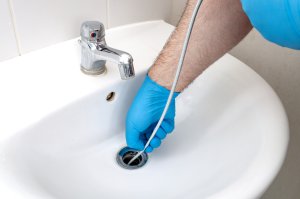Your roof plays a critical role in protecting your home and its plumbing system. A well-maintained roof helps prevent water damage, leaks, and other plumbing issues that can cause significant problems and costly repairs. Regular roof inspections can help identify and prevent these problems before they become more severe.
Why Regular Roof Inspections are Important
Roofs are exposed to the elements every day, which can cause damage over time. A small leak or missing shingle can quickly escalate into a major plumbing issue if not addressed promptly. Regular roof inspections help you catch potential problems early, allowing you to make repairs before they turn into bigger and more expensive issues.
According to a study by the National Roofing Contractors Association, regular roof inspections can help extend the life of your roof by an average of 15 years. This not only saves you money in the long run but also helps prevent plumbing problems that can cause significant damage to your home.
The Impact of Roofing on Plumbing Systems
Your roof and plumbing system are closely connected. A damaged roof can cause leaks, which can lead to water damage and other plumbing issues. For example, a leaky roof can cause water to seep into your walls and insulation, creating mold and mildew that can harm your health. A leaky roof can also cause damage to your pipes and fixtures, leading to leaks and other plumbing problems.
A case study of a homeowner in the Pacific Northwest demonstrates the importance of regular roof inspections. After several years of neglect, the homeowner’s roof was in disrepair, and water was starting to seep into the home’s walls and insulation. The homeowner was faced with costly repairs to address the mold, mildew, and other damage caused by the leaky roof.
We asked the owner of Aboveitallroofing about ‘How Regular Roof Inspections Prevent Plumbing Issues’. This is what he told us
Regular roof inspections can help you identify and prevent these types of problems. During an inspection, a roofing professional will check for missing or damaged shingles, check the flashing and sealing around chimneys, vents, and skylights, and inspect the gutters for signs of damage or clogging. They will also check for signs of water damage, such as water stains, to help identify potential leaks.
By catching potential problems early, regular roof inspections can help you avoid costly repairs and extend the life of your roof. Regular roof inspections can also help prevent plumbing problems, such as leaks, water damage, and mold and mildew.
The connection between roofing and plumbing systems is often overlooked, but it is critical to understand the impact that roofing can have on your plumbing system. A well-maintained roof helps protect your home from water damage and leaks, while a damaged or neglected roof can lead to significant plumbing problems. Here are some of the ways that roofing can affect plumbing systems:
Leaks: A leaky roof can cause water to seep into your walls and insulation, leading to leaks in your plumbing system. Water can damage pipes and fixtures, causing leaks and other plumbing issues.
Water damage: A leaky roof can also cause water damage to your home, including to the walls, ceilings, and flooring. This can lead to mold and mildew growth, which can harm your health and cause further damage to your home.
Clogged gutters: Clogged gutters can cause water to back up, leading to leaks and water damage to your roof and walls. Over time, clogged gutters can also damage your roof and lead to other plumbing problems.
Damaged flashing: Flashing is the material used to seal joints around chimneys, vents, and skylights. Damaged flashing can allow water to seep into your home, causing leaks and water damage.
The Benefits of Regular Roof Inspections:
Regular roof inspections offer numerous benefits for preventing plumbing problems. Here’s why regular roof inspections are important:
- Early detection: Regular roof inspections can help detect issues before they become more severe and costly to repair. By identifying potential problems early, you can take steps to prevent them from becoming bigger issues.
- Cost savings: Regular roof inspections can save you money in the long run by preventing more significant and costly plumbing problems from occurring. By identifying and fixing small issues early on, you can avoid costly repairs and replacements in the future.
- Protects your investment: Your roof is a major investment, and regular roof inspections can help protect that investment by ensuring its longevity and performance. Regular inspections can also help you make informed decisions about the necessary repairs and upgrades to your roof and plumbing systems.
During a roof inspection, different types of issues can be detected, including:
- Leaks and water damage
- Damage to shingles or tiles
- Clogged gutters
- Loose or damaged flashing
- Improper ventilation
It’s important to note that regular roof inspections should be performed by a professional who has the knowledge and expertise to identify potential problems and provide recommendations for repair. The cost of a regular roof inspection is minimal compared to the cost of repairing significant plumbing problems.
What to Look for During a Roof Inspection:
A roof inspection is a comprehensive examination of the roofing system and surrounding areas to identify any potential issues or areas in need of repair. Here’s a checklist of items to look for during a roof inspection:
- Roofing materials: Check the condition of shingles, tiles, or other roofing materials for signs of wear and tear, damage, or missing pieces.
- Flashing: Look for damaged, loose, or missing flashing around chimneys, vents, and skylights.
- Gutters: Check for clogged gutters and inspect for damage or signs of wear and tear.
- Ventilation: Ensure proper ventilation to prevent moisture buildup, which can lead to mold and mildew growth.
- Water damage: Look for signs of water damage, including water spots on the ceiling, damp walls, and mold and mildew growth.
A professional roof inspector will have the knowledge and expertise to identify these and other potential issues, as well as provide recommendations for repair. A professional roof inspector will also look for any signs of structural damage, improper installation, or other issues that could impact the overall performance and longevity of your roof.
Professional roof inspections are important because they provide a comprehensive examination of the roof and surrounding areas. A professional roof inspector has the knowledge and expertise to identify potential problems and provide recommendations for repair. A professional roof inspection can also give you peace of mind knowing that your roof is in good condition and that any potential problems have been addressed.
How to Schedule a Roof Inspection:
- Scheduling a roof inspection is an important step in maintaining the health and longevity of your roof and plumbing system. Here are the steps for scheduling a roof inspection:
- Determine the need: Determine if you need a roof inspection by looking for signs of damage, such as missing shingles, water spots on the ceiling, or mold and mildew growth.
- Choose a reputable roof inspector: Research and choose a reputable roof inspector who has the knowledge, experience, and expertise to perform a comprehensive roof inspection. Look for reviews and references, and ask for a certificate of insurance.
- Schedule the inspection: Contact the roof inspector and schedule the inspection at a convenient time. Some roof inspectors may offer same-day or next-day services, while others may require a few days’ notice.
- Prepare for the inspection: Prepare for the inspection by removing any obstacles from the roof and making sure the inspector has access to all areas of the roof.
- Review the inspection report: After the inspection, review the report provided by the roof inspector, which will detail any potential problems or areas in need of repair.
Regular roof inspections are important to maintain the health and longevity of your roof and plumbing system. By scheduling a roof inspection, you can identify potential problems early on and take steps to prevent them from becoming more severe. Regular roof inspections can also help you make informed decisions about necessary repairs and upgrades to your roof and plumbing system.
When choosing a reputable roof inspector, consider the following tips:
- Look for reviews and references from past clients.
- Ask for a certificate of insurance.
- Check for certifications and memberships in professional organizations.
- Verify the inspector’s experience and expertise.
- Get a written estimate and inspection report
Conclusion:
In conclusion, regular roof inspections are an important aspect of maintaining the health and longevity of your roof and plumbing system. By detecting and preventing potential problems, you can avoid costly repairs, improve the safety and well-being of those who live or work in the building, and extend the lifespan of your roof.
The benefits of regular roof inspections are numerous, including the early detection of potential plumbing problems, cost savings, and the peace of mind that comes with knowing your roof and plumbing system are in good condition. During a roof inspection, a professional inspector will examine the roof’s structure, shingles, gutters, and downspouts, as well as the connections between the roof and plumbing system.
It is important to prevent plumbing problems, as they can be costly and disruptive to daily life. Regular roof inspections can help identify and prevent these issues, ensuring the safety and well-being of those who live or work in the building.
We encourage readers to schedule regular roof inspections to ensure the health and longevity of their roof and plumbing system. By taking this important step, you can protect your investment and ensure the safety and well-being of those who matter most.



